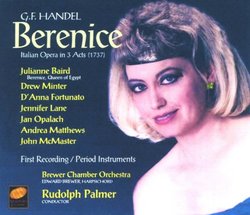| All Artists: George Frideric Handel, Rudolph Palmer, Julianne Baird, Jennifer Lane, Brewer Chamber Orchestra, D'Anna Fortunato, Drew Minter, Andrea Matthews, John McMaster, Jan Opalach Title: Handel - Berenice Members Wishing: 1 Total Copies: 0 Label: Newport Classic Release Date: 5/27/2003 Album Type: Box set Genre: Classical Styles: Opera & Classical Vocal, Historical Periods, Baroque (c.1600-1750) Number of Discs: 3 SwapaCD Credits: 3 UPC: 723722216725 |
Search - George Frideric Handel, Rudolph Palmer, Julianne Baird :: Handel - Berenice
 | George Frideric Handel, Rudolph Palmer, Julianne Baird Handel - Berenice Genre: Classical
|
Larger Image |
CD DetailsSimilar CDs |
CD ReviewsA satisfactory first recording KC | London, England | 02/10/2009 (3 out of 5 stars) "The American record companies Newport Classic and Vox deserve praise in creating some notable recordings of Handel's rarely performed or almost unknown operas and oratorios. Thanks to the producer John Ostendorf they have released from the 1990s until the present many world première recordings of his works. No matter how this fact is important for the musical world, we must openly say that the artistic level of their recordings is unbalanced. However, it would be a big mistake to simply ignore them because they can also offer many merits. First of all, it is of course Handel's glorious music. Even in his weaker or just for different reasons less known works we can find pieces full of great music. Then it is also the rare opportunity to hear works that appear on stage or even in concert halls only very seldom, and some of them (as in the case of 'Berenice') could be heard after more than 250 years. And after all, we must say that these recordings have also their very nice moments. All of these general aspects apply also to the 'Berenice' recording. The title role of Berenice is performed by the American soprano Julianne Baird. In the 1980s she co-operated on several Bach projects and from the 1990s until the present has created most of the main soprano parts in Handel's operas and oratorios in the Newport Classic and Vox recordings. Her crystal-clear voice seems to be created especially for baroque music, and she is also a fine interpreter of Handel lyric parts. We must mention here that her lovely voice has also certain limits, and it would be quite difficult to imagine her, for instance, in the role of Alcina which was, like Berenice, written for Handel's singer Anna Strada. However, in her many recitatives during the opera she proves that her voice has also its dramatic side, and in the beautiful aria 'Chi t'intende?' sounds nearly perfect. The role of Prince Demetrius came to the mezzo-soprano Jennifer Lane who has received certain reputation thanks to her frequent appearances at the Handel Festival in Göttingen and other places around Europe. The listener can appreciate the velvet colour of her dark voice somewhere between mezzo and contralto, with a considerable vocal range, well-voiced low register (displayed especially in cadenzas) and remarkable dramatic expression. The minor role of Arsace is also well performed by the American countertenor Drew Minter. This smaller part, written for Handel's contralto Maria Caterina Negri (a specialist in male roles), offers a virtuoso but not very profound music. Mr Minter took the opportunity and it was a pleasure to listen to his light flexible voice. Through the 1990s he performed regularly at the Göttingen Handel Festival where he created important roles in Handel operas. Most of these performances were recorded by the French company 'harmonia mundi' and are still available. Countertenor puritans might have a problem with his occasional jumps into the baritone register, but for most listeners it will be just a welcome complement to his bright falsetto voice. Other parts were cast more or less problematically. The role of Alexander, originally performed by the soprano-castrato Gioacchino Conti called Gizziello, was committed to the soprano Andrea Matthews. There is too much vibrato in her voice for this kind of music and her high notes sound often unpleasantly. The role of the Queen's sister, Selene, was written for the mezzo-soprano Francesca Bertolli, one of those singers who had deserted first to the Opera of the Nobility and then came back to Handel. In this recording we can hear the mezzo D'Anna Fortunato in the same role. I consider her unpleasantly coloured and sort of tired voice as a big minus of all Newport Classic and Vox recordings. Unlike other Handel's recordings of these companies where she sung the main castrato roles, in the smaller part of Selene her voice could not, fortunately, do an extensive damage. The minor roles of the Roman ambassador Fabio and the Egyptian minister Aristobolo are well performed by the tenor John McMaster and the bass Jan Opalach. All da capo parts of arias are tastefully embellished, as was usual in opera seria of the 18th century. A special chapter of these recordings is the orchestral part played on period instruments by the Brewer Chamber Orchestra conducted by Rudolph Palmer. According to the sleeve-note, there were twenty-eight players in the string section in this recording (except that only a not doubled oboe, a bassoon and a harpsichord were added to the orchestra), but the real sound that we hear is very subtle. More importantly, the orchestral play is in my opinion inexpressive and monotonous and does not reach the level of specialized European baroque ensembles. It sounds a bit better in independent orchestral parts of the opera, but in arias falls into a tonelessness and loses dramatic expression.
Summary: The Newport Classic recording of 'Berenice' (No. NPD 85620/3) is a very welcome addition to the Handel catalogue, although its quality is quite unbalanced. " |

 Track Listings (23) - Disc #1
Track Listings (23) - Disc #1

